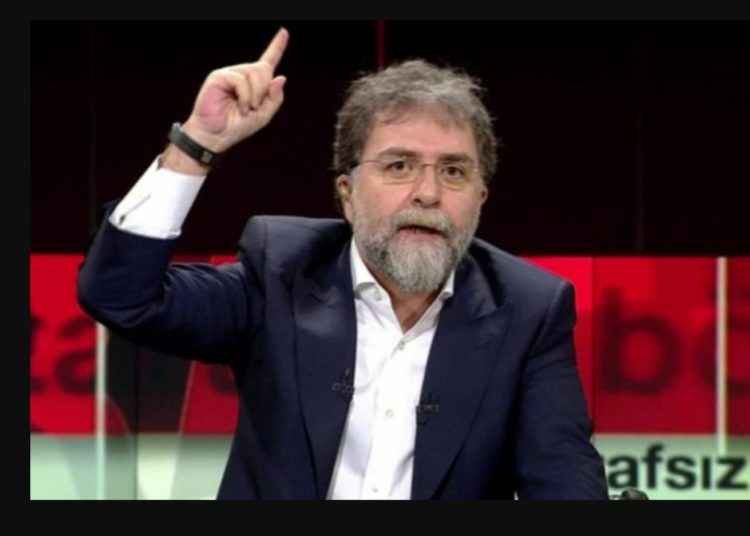Abdullah Bozkurt
Turkish journalist Ahmet Hakan Coşkun, 53, engaged in secret talks with Turkish President Recep Tayyip Erdoğan’s point man, who was partnering with a one-time al-Qaeda financier, confidential documents have revealed.
According to a wiretap that was authorized by a Turkish court as part of an investigation into an organized crime network in Turkey, Coşkun, a graduate of a religious school with a background in Islamist media in Turkey, was identified as discussing a possible job prospect with Mehmet Fatih Saraç, another Islamist figure, in a secret talks.
Saraç was brought in to the Ciner Media Group on December 26, 2012 as deputy chairman of the board of directors by the owner, Turgay Ciner, at the special request of Erdoğan. His mandate was to slant the editorial policy of the Ciner media divisions, including the Habertürk newspaper, Habertürk TV, news websites and radio stations, in favor of Erdoğan and his government. In exchange Ciner, who has interests in various sectors from mining to energy, benefited from favorable contracts and tenders from the government.
In a phone conversation that took place on January 7, 2013 Saraç praised Coşkun not a journalist but rather as one of his most trusted people. “I said this very clearly, that Ahmet is one of us before being a journalist,” Saraç told Coşkun, referring to a sales pitch he did with his boss Turgay. In response, Coşkun said “alright,” agreeing with Saraç’s characterization of him. “I mean, being a journalist is something separate. One can be a journalist today and turn into an engineer tomorrow,” Saraç said as he tried to convince him to join the Ciner Media Group.
Transcript of the wiretapped conversation between Fatih Saraç and Ahmet Hakan Coşkun:
Coşkun said he had not yet made up his mind about the offer and requested more time to consider the proposal. Pressed by Saraç as to what was bothering him, Coşkun said he was wondering how much money he would earn if he were to be employed by Ciner. Saraç explained that whatever he was currently getting at the Doğan Media Group, his pay grade would be above that. He also asked how much he was paid by his current employer, Coşkun declined to divulge that information and instead asked for a face-to-face meeting to discuss the details.
Moreover, Saraç said he had discussed the matter with Fatih Altaylı, the editor-in-chief of Habertürk, and said Altaylı had expressed no objection to Coşkun’s employment in the media group. He warned, however, that the group needed to maintain a delicate balance in the pay grades of Hakan and Altaylı. Coşkun said he had no objection to this.
Coşkun had a long career in Turkey’s Islamist media and was close to political Islamists, the Turkish equivalent of the Muslim Brotherhood. At one point Saraç also talked about a foundation, at which he said he was not asking Coşkun to serve, an indication that the two went a long way back. He was referring to İlim Yayma Vakfı (Foundation for the Dissemination of Information), a Turkish Muslim Brotherhood foundation where Saraç served as deputy chairman for some years. The foundation’s purpose has been to support the establishment of imam-hatip religious schools. Both Coşkun and President Erdoğan are graduates of such schools in Turkey.

The foundation, first established as a society called Ilim Yayma Cemiyeti on October 11, 1951, was flagged by the Central Intelligence Agency on October 10, 1953 as part of the Muslim Brotherhood. In a report that was declassified on September 23, 1999 the CIA pointed to İlim Yayma as “the cover name of an Arab secret organization which has as its purpose the establishment of secret schools to train Imams and preachers in all countries where the teaching of Arabic speech and writing is not allowed, and the support of these schools with funds.”
Coşkun grew up as a son of Mufti (senior cleric) Hamdi Coşkun. He had worked for Islamist media outlets Kanal 7 and Yeni Şafak for years before he was hired by media mogul Aydın Doğan for CNN’s Turkish affiliate, CNN Türk. When Saraç offered him a job at Habertürk, Coşkun was still working for Doğan’s media group, which today is a government mouthpiece. He became editor-in-chief of the Hurriyet daily in November 2019 following the purchase of the Doğan media companies by Yıldırım Demirören, a pro-Erdoğan businessman, on March 22, 2018. Coşkun is often embedded with President Erdoğan’s press corps when he travels abroad for state visits and parrots the government’s narrative in his writings in the newspaper and comments on CNN Türk.


Saraç is a graduate of a Saudi university in Mecca and the son of prominent religious sect leader Muhammed Emin Saraç, described as a role model for President Erdoğan, who was seen in 2014 kissing the hand of the cleric as a sign of respect and reverence. Saraç was also found to be a long-time business partner of Saudi national Yasin al-Qadi, who for years had been listed as an al-Qaeda financier by both the US Treasury and the UN.
The wiretap was authorized by the Istanbul 2nd High Criminal Court, which was looking into terrorism-related cases. The authorization was granted on December 24, 2012 as part of investigation file No. 2012/656.
Al-Qadi and Erdoğan’s son Bilal were leading suspects in an organized crime investigation pursued by prosecutors in Istanbul and were the subjects of detention warrants issued on December 25, 2013 by the prosecutors. However, Erdoğan stepped in, illegally preventing the execution of the warrants by ordering the police to ignore the prosecutor’s orders. After the removal of the prosecutors and police chiefs who were involved in the investigation, Erdoğan managed to whitewash the crimes of his associates.












